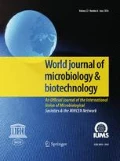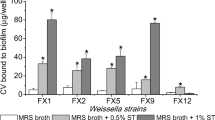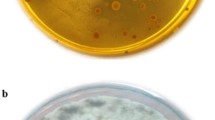Abstract
This study aimed to examine the influence of two prebiotics, fructo-oligosaccharides (FOS) and xylo-oligosaccharides (XOS), on probiotic properties (resistance to low pH and bile salt, hydrophobicity and auto-aggregation), metabolites production, and antimicrobial activity of probiotic Lactiplantibacillus (L. pentosus S42 and L. plantarum S61) and Levilactobacillus (L. brevis S27) strains isolated from fermented olive. The results demonstrated the ability of strains to ferment XOS more than FOS as a sole carbon source, resulting in pH reduction. The prebiotics (FOS and XOS) significantly increased (p < 0.05) their survival in gastro-intestinal conditions (low pH and 0.3% of bile salts), as well as their hydrophobicity, auto-aggregation and production of proteins, compared to glucose (control). The major organic acids produced by Lactiplantibacillus and Levilactobacillus strains, were oxalic, malic and lactic acids from FOS, XOS and glucose, respectively. No antimicrobial activity was observed from cell-free supernatant (CFS) of Lactiplantibacillus and Levilactobacillus strains obtained from FOS. In the presence of XOS the organic acids, produced by Lactiplantibacillus and Levilactobacillus strains, were more diverse with high contents, and exhibited higher antifungal and antibacterial activities, more than that of FOS and glucose. The combination of L. plantarum S61 and XOS demonstrated the highest inhibition zones ranges of 20.7–22.2 mm against pathogenic bacteria and 29.2–30 mm against yeasts. This combination can be used in production of antifungal preservatives and pharmaceuticals, against pathogenic and spoilage yeasts.
Graphic abstract






Similar content being viewed by others
References
Aachary AA, Prapulla SG (2011) Xylooligosaccharides (XOS) as an emerging prebiotic: microbial synthesis, utilization, structural characterization, bioactive properties, and applications. Compr Rev Food Sci Food Saf 10:2–16. https://doi.org/10.1111/j.1541-4337.2010.00135.x
Abouloifa H et al (2020a) Characterization of probiotic properties of antifungal Lactobacillus strains isolated from traditional fermenting green olives. Probiotics Antimicrob Proteins 12:683–696. https://doi.org/10.1007/s12602-019-09543-8
Abouloifa H et al (2020b) Technological properties of potential probiotic Lactobacillus strains isolated from traditional fermenting green olive. J Microbiol Biotechnol Food Sci 9:884–889. https://doi.org/10.15414/jmbfs.2020.9.5.884-889
Abushelaibi A, Al-Mahadin S, El-Tarabily K, Shah NP, Ayyash M (2017) Characterization of potential probiotic lactic acid bacteria isolated from camel milk. LWT Food Sci Technol 79:316–325. https://doi.org/10.1016/j.lwt.2017.01.041
Alexander C, Swanson KS, Fahey GC, Garleb KA (2019) Perspective: physiologic importance of short-chain fatty acids from nondigestible carbohydrate fermentation. Adv Nutr 10:576–589. https://doi.org/10.1093/advances/nmz004
Anand S, Mandal S, Singh KS, Patil P, Tomar SK (2018) Synbiotic combination of Lactobacillus rhamnosus NCDC 298 and short chain fructooligosaccharides prevents enterotoxigenic Escherichia coli infection. LWT Food Sci Technol 98:329–334. https://doi.org/10.1016/j.lwt.2018.08.061
Anang DM, RusuL G, Radu S, Bakar J, Beuchat LR (2006) Inhibitory effect of oxalic acid on bacterial spoilage of raw chilled chicken. J Food Prot 69:1913–1919
Arenahalli Ningegowda M, Siddalingaiya Gurudutt P (2012) In vitro fermentation of prebiotics by Lactobacillus plantarum CFR 2194: selectivity, viability and effect of metabolites on beta-glucuronidase activity. World J Microbiol Biotechnol 28:901–908. https://doi.org/10.1007/s11274-011-0887-z
Ashwini A et al (2019) Reactive mechanism and the applications of bioactive prebiotics for human health: review. J Microbiol Methods 159:128–137. https://doi.org/10.1016/j.mimet.2019.02.019
Cazy (2020) Glyocisdes hydrolases. http://www.cazy.org/Glycoside-Hydrolases.html. Accessed October 15 2020
Chen L, Karboune S (2019) Prebiotics in food and health: properties, functionalities, production, and overcoming limitations with second-generation levan-type fructooligosaccharides. In: Laurencemelton FS, Varelis P (eds) Encyclopedia of Food Chemistry, Vol. 3, 1st edn. Elsevier, New York, pp 271–279. https://doi.org/10.1016/B978-0-08-100596-5.21746-0
Coban HB (2020) Organic acids as antimicrobial food agents: applications and microbial productions. Bioprocess Biosyst Eng 43:569–591. https://doi.org/10.1007/s00449-019-02256-w
Comerlato CB, Ritter AC, Miyamoto KN, Brandelli A (2020) Proteomic study of Enterococcus durans LAB18S growing on prebiotic oligosaccharides. Food Microbiol 89:103430. https://doi.org/10.1016/j.fm.2020.103430
FAO/WHO (2002) Joint FAO/WHO working group report on drafting guidelines for the evaluation of probiotics in food April 30 and May 1. http://www.who.int/foodsafety/fs_management/en/probiotic_guidelines.pdf. Accessed May 5 2018
Ghabbour N, Lamzira Z, Thonart P, Cidalia P, Markaoui M, Asehraou A (2011) Selection of oleuropein-degrading lactic acid bacteria strains isolated from fermenting Moroccan green olives. Grasas Aceites 62:84–89. https://doi.org/10.3989/gya.055510
Gibson GR et al (2017) Expert consensus document: the international scientific association for probiotics and prebiotics (ISAPP) consensus statement on the definition and scope of prebiotics. Nat Rev Gastroenterol Hepatol 14:491–502. https://doi.org/10.1038/nrgastro.2017.75
Gibson GR, Roberfroid MB (1995) Dietary modulation of the human colonic microbiota: introducing the concept of prebiotics. J Nutr 125:1401–1412. https://doi.org/10.1093/jn/125.6.1401
Gomaa EZ (2017) Effect of prebiotic substances on growth, fatty acid profile and probiotic characteristics of Lactobacillus brevis NM101-1. Microbiology 86:618–628. https://doi.org/10.1134/s0026261717050095
Health Canada (2009) Guidance document—the use of probiotic microorganisms in food. April 2009. https://www.canada.ca/content/dam/hc-sc/migration/hc-sc/fn-an/alt_formats/hpfb-dgpsa/pdf/legislation/probiotics_guidance-orientation_probiotiques-eng.pdf. Accessed 04 March 2020
Hill C et al (2014) Expert consensus document. The International Scientific Association for Probiotics and Prebiotics consensus statement on the scope and appropriate use of the term probiotic. Nat Rev Gastroenterol Hepatol 11:506–514. https://doi.org/10.1038/nrgastro.2014.66
Kaplan H, Hutkins RW (2000) Fermentation of fructooligosaccharides by lactic acid bacteria and Bifidobacteria. Appl Environ Microbiol 66:2682–2684. https://doi.org/10.1128/aem.66.6.2682-2684.2000
Khangwal I, Shukla P (2019) Potential prebiotics and their transmission mechanisms: recent approaches. J Food Drug Anal 27:649–656. https://doi.org/10.1016/j.jfda.2019.02.003
Kleerebezem M et al (2003) Complete genome sequence of Lactobacillus plantarum WCFS1. Proc Natl Acad Sci 100:1990–1995. https://doi.org/10.1073/pnas.0337704100
Knob A, Terrasan CRF, Carmona EC (2009) β-Xylosidases from filamentous fungi: an overview. World J Microbiol Biotechnol 26:389–407. https://doi.org/10.1007/s11274-009-0190-4
Kwak AM, Lee IK, Lee SY, Yun BS, Kang HW (2016) Oxalic acid from lentinula edodes culture filtrate: antimicrobial activity on phytopathogenic bacteria and qualitative and quantitative analyses. Mycobiology 44:338–342. https://doi.org/10.5941/MYCO.2016.44.4.338
Lim S-M, Jeong K-S, Lee N-G, Park S-M, Ahn D-H (2011) Synergy effects by combination with lactic acid bacteria and frutooligosaccharides on the cell growth and antimicrobial activity. Food Sci Biotechnol 20:1389–1397. https://doi.org/10.1007/s10068-011-0191-6
Mani-López E, García HS, López-Malo A (2012) Organic acids as antimicrobials to control Salmonella in meat and poultry products. Food Res Int 45:713–721. https://doi.org/10.1016/j.foodres.2011.04.043
Martinez RC, Bedani R, Saad SM (2015) Scientific evidence for health effects attributed to the consumption of probiotics and prebiotics: an update for current perspectives and future challenges. Br J Nutr 114:1993–2015. https://doi.org/10.1017/S0007114515003864
PubChem (2020a) Oxalic acid. https://pubchem.ncbi.nlm.nih.gov/compound/Oxalic-acid#section=Heat-of-Combustion. Accessed May 03 2020
PubChem (2020b) Oxalic acid: Use and Manufacturing. https://pubchem.ncbi.nlm.nih.gov/compound/525#section=Use-and-Manufacturing. Accessed October 10 2020
Rousseau V, Lepargneur JP, Roques C, Remaud-Simeon M, Paul F (2005) Prebiotic effects of oligosaccharides on selected vaginal lactobacilli and pathogenic microorganisms. Anaerobe 11:145–153. https://doi.org/10.1016/j.anaerobe.2004.12.002
Sims IM, Ryan JL, Kim SH (2014) In vitro fermentation of prebiotic oligosaccharides by Bifidobacterium lactis HN019 and Lactobacillus spp. Anaerobe 25:7–11. https://doi.org/10.1016/j.anaerobe.2013.11.001
Singh SP, Jadaun JS, Narnoliya LK, Pandey A (2017) Prebiotic oligosaccharides: special focus on fructooligosaccharides, its biosynthesis and bioactivity. Appl Biochem Biotechnol 183:613–635. https://doi.org/10.1007/s12010-017-2605-2
Slavin J (2013) Fiber and prebiotics: mechanisms and health benefits. Nutrients 5:1417–1435. https://doi.org/10.3390/nu5041417
Sorrells KM, Enigl DC, Hatfield JR (1989) Effect of pH, acidulant, time, and temperature on the growth and survival of Listeria monocytogene. J Food Prot 52:571–573
Thiennimitr P et al (2018) Lactobacillus paracasei HII01, xylooligosaccharides, and synbiotics reduce gut disturbance in obese rats. Nutrition 54:40–47. https://doi.org/10.1016/j.nut.2018.03.005
Xiuhua Yu, Yin J, Li L, Luan C, Zhang J, Zhao C, Li S (2015) Prebiotic potential of xylooligosaccharides derived from corn cobs and their in vitro antioxidant activity when combined with Lactobacillus. J Microbiol Biotechnol 25:1084–1092. https://doi.org/10.4014/jmb.1501.01022
Yang EJ, Chang HC (2010) Purification of a new antifungal compound produced by Lactobacillus plantarum AF1 isolated from kimchi. Int J Food Microbiol 139:56–63. https://doi.org/10.1016/j.ijfoodmicro.2010.02.012
Zheng J et al (2020) A taxonomic note on the genus Lactobacillus: Description of 23 novel genera, emended description of the genus Lactobacillus Beijerinck 1901, and union of Lactobacillaceae and Leuconostocaceae. Int J Syst Evol Microbiol 70:2782–2858. https://doi.org/10.1099/ijsem.0.004107
Acknowledgements
The authors are grateful to CNRST (PPR/19/2015), Canada Foundation for Innovation (CFI), Morocco-Italy cooperation (CNRST: 307/2018), and to Morocco-Tunisia cooperation (17TM06) for their support.
Author information
Authors and Affiliations
Contributions
AA and SK selected the study design and supervised the Lab work. HA, NK and YR conducted the experiments. AA, SK, MB, GD, RBS, ES and HA wrote the manuscript. All authors read and approved the manuscript.
Corresponding author
Ethics declarations
Conflict of interest
The authors declare that they have no conflict of interest.
Additional information
Publisher's Note
Springer Nature remains neutral with regard to jurisdictional claims in published maps and institutional affiliations.
Rights and permissions
About this article
Cite this article
Abouloifa, H., Khodaei, N., Rokni, Y. et al. The prebiotics (Fructo-oligosaccharides and Xylo-oligosaccharides) modulate the probiotic properties of Lactiplantibacillus and Levilactobacillus strains isolated from traditional fermented olive. World J Microbiol Biotechnol 36, 185 (2020). https://doi.org/10.1007/s11274-020-02961-9
Received:
Accepted:
Published:
DOI: https://doi.org/10.1007/s11274-020-02961-9




